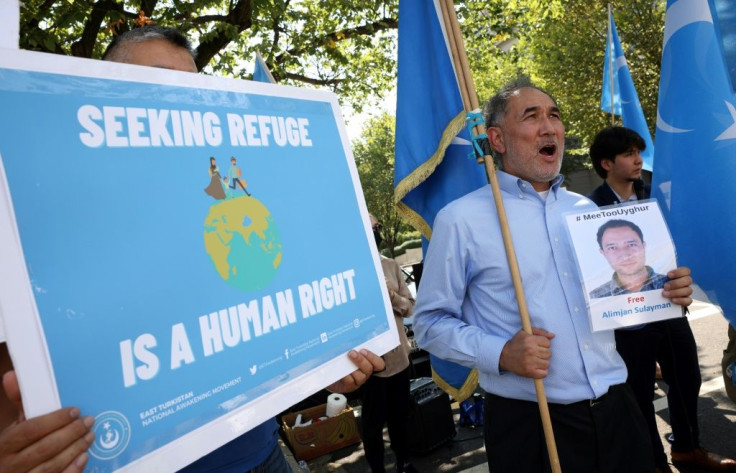Uyghurs To Ride High On US Diplomatic Boycott Of Beijing Winter Olympics

Buoyed by the U.S. diplomatic boycott of Beijing Winter Olympics, the Uyghur diaspora is set to beef up its global campaign against the alleged Chinese genocide in western Xinjiang province.
On Dec. 8, the U.S. wrapped up its diplomatic move with a legislation that bans a wide array of imported products made in Xinjiang, citing forced labor.
But to turn the bill to their advantage, the Uyghur diaspora will have to work hard to as legislation's fate is uncertain in the Senate, where similar efforts were stalled earlier due to high business interests on Xinjiang which churns out roughly one in five cotton garments sold globally and polysilicon, used for making solar panels and smartphones, among others.
The largest Uyghur diaspora outside of Central Asia in Turkey welcomed the US boycott of the Winter Games in Beijing on Dec. 7, and urged other nations to follow suit. Nearly 50,000 Uyghurs, Muslim Turkic-speaking ethnic group, live in Turkey out of 1.5 million worldwide.
The Uyghur Human Rights Project, a U.S. advocacy organization, urged all governments not to participate in the "spectacle of 21st-century genocide games."
China has turned Xinjiang, a former colonial outpost bordering Tajikistan and Kazakhstan, into a region for rapid economic development. To make the ethnic people, comprising mainly including Kazakhs, Kyrgyz, and other ethnic Turkic Muslims, fall in line, a meticulous assimilation program is on so that factories, farms, fancy projects, infrastructure, and mines could be built up without resistance and interference for the Silk Road which is at the heart of China's Belt and Road Initiative (BRI).
It is through Xinjiang, China is going to tap lucrative markets in Arabia, citing the glory of the ancient export of silk from China to trading centers in the Middle East.
According to independent estimates, more than a million men and women out of 11 million Uighurs have been picked up to put behind the sprawling network of internment camps, which China says exist for "re-education" and serve as vocational centers with the latest technological tools for anti-terrorism and anti-poverty measures.
Now that the U.S. has globalized the Uyghur genocide, the third attempt to have the International Criminal Court (ICC) to probe Chinese authorities for alleged crimes against humanity is set to gather pace.
The ICC is yet to take a decision on the Nov. 11 attempt by the East Turkistan government-in-exile and the East Turkistan National Awakening Movement that the Uyghurs are forcefully deported from Tajikistan, a party to the ICC.
According to the groups' lawyer Rodney Dixon QC, Chinese officers are "operating on Tajikistan soil" to get the Uyghurs detained, arrested, and deported.
The previous submissions also included accounts of deportations in Tajikistan, but the ICC dismissed them, saying the crimes were committed by Chinese nationals within China.
The Beijing Winter Olympics, starting on Feb. 4, will make the Chinese capital the first to have hosted both summer and winter editions. So far, only Australia and New Zealand have joined the U.S. in citing the Uyghur issue to diplomatically boycott Winter Olympics in Beijing. New Zealand is not sending officials, citing COVID-19 curbs.
US-based Campaign for Uyghurs along with other advocacy groups like The Peace Project is seeking a full boycott of the Beijing Games under the Berlin-Beijing campaign, which seeks a boycott in the historical context of the 1936 Berlin Olympics.
The Uyghur diaspora has already targeted private companies sponsoring the Beijing Winter Olympics. U.S. firms like Coca-Cola, Intel, Visa International and Airbnb are among the 13 Olympic partners. Other major multinational sponsors are Allianz, Samsung, Omega, Atos and Panasonic.
The campaigners have urged the sponsors to use their influence with China ahead of the 2022 sporting event to educate the world of the alleged genocide underway in Xinjiang province.
U.S. congressional panels and human rights groups have blamed the companies for "putting profits ahead of human rights." Calling the Winter Olympics the "genocide games", the campaigners have remained Brian Chesky, chief executive officer of Airbnb, about the plight of the Uyghurs held in detention camps Xinjiang. The San Francisco-based firm is known for its CSR (corporate social responsibility) activities.
The campaign is being launched in the U.S., the UK, the Netherlands, Canada, Norway, Finland, France, Australia, and Japan.
The Uyghurs are set to make it hard for China to present "simple, safe and splendid" Olympic Games before the world.
























